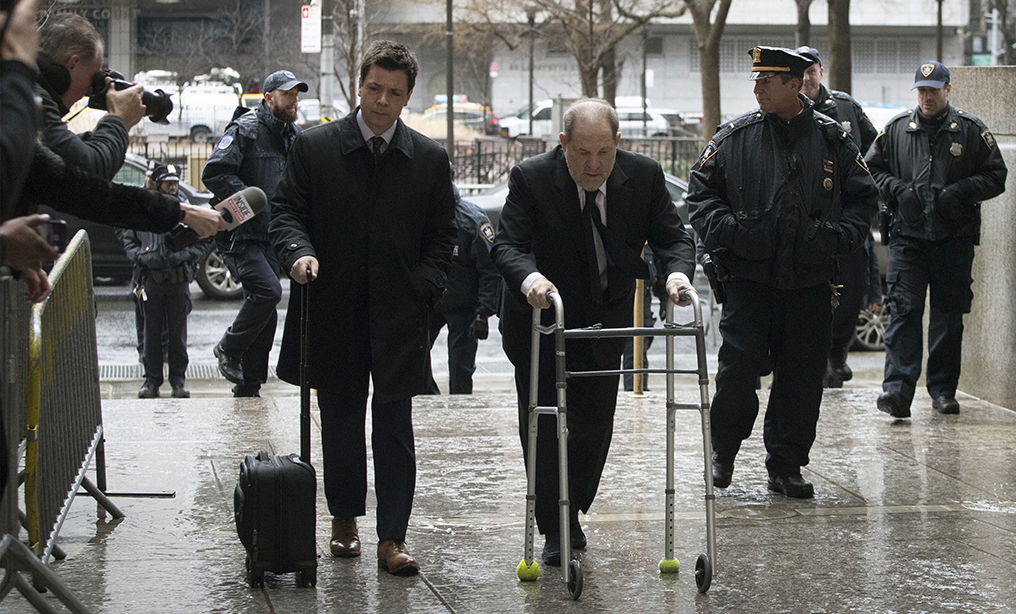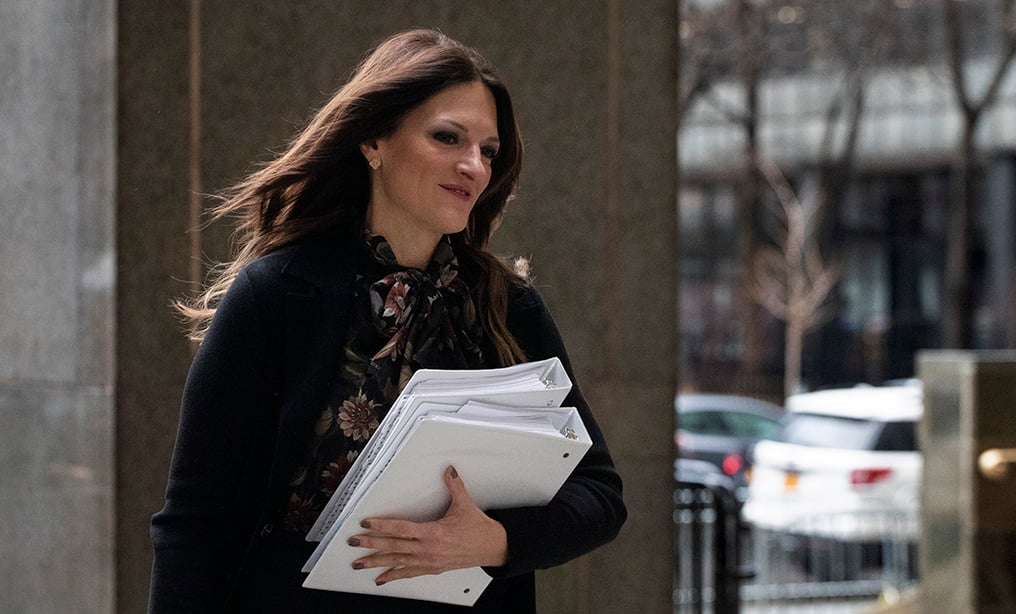First Jurors Seated in Harvey Weinstein Criminal Trial Told Trial Is Not About #MeToo
Manhattan Criminal Court Judge James Burke told the jurors that the trial would not be a referendum on sexual harassment, women's rights, or the #MeToo movement.
January 16, 2020 at 05:49 PM
4 minute read
 Harvey Weinstein arrives at a Manhattan courthouse to attend jury selection in his trial on rape and sexual assault charges on Thursday, Jan. 16. Photo: Mark Lennihan/AP
Harvey Weinstein arrives at a Manhattan courthouse to attend jury selection in his trial on rape and sexual assault charges on Thursday, Jan. 16. Photo: Mark Lennihan/AP
Seven jurors were seated in the criminal trial of former Hollywood producer Harvey Weinstein, who has pleaded not guilty to charges of predatory sexual assault and rape.
The seven were seated on the first day that void dire shifted to in-court questioning of prospective jurors.
Manhattan Criminal Court Judge James Burke told the jurors that the trial would not be a referendum on sexual harassment, women's rights, or the #MeToo movement. Conversations on those subjects accelerated as dozens of women accused Weinstein of sexual misconduct, but he has been criminally charged in just a handful of cases in New York and Los Angeles.
"You are, of course, allowed to have strongly held beliefs, but that is not the question [in this case]," Burke said.
Donna Rotunno, one of Weinstein's defense attorneys, asked potential jurors if they had heard anything positive about Weinstein.
"Let the record reflect that no hands have been raised," she said. One potential juror said positive things have, in fact, been said about Weinstein, while another mentioned his successful career in the movie business.
 Donna Rotunno, Harvey Weinstein's defense attorney, arrives at a Manhattan courthouse on Thursday, Jan. 16. Photo: Mark Lennihan/AP
Donna Rotunno, Harvey Weinstein's defense attorney, arrives at a Manhattan courthouse on Thursday, Jan. 16. Photo: Mark Lennihan/APThursday's pool of about 140 potential jurors was winnowed from six days of juror prescreening. During each day of prescreening, about 100 potential jurors answered basic questions about scheduling and their ability to be impartial.
Burke defended the process in court Thursday morning as he denied a defense motion for private one-on-one questioning with each potential juror.
"This voir dire is hardly business as usual," he said. "We are conducting a multiple-stage jury selection and voir dire, and it is in fact revealing the very individuals who should not serve."
A total of about 200 people got through the screening process and filled out juror questionnaires, but prosecutors and Weinstein's defense team agreed to dismiss about 60 potential jurors after receiving their questionnaires.
While hundreds of potential jurors have already been dismissed from the case, Burke called one man back into court Thursday morning and told him to prepare for a court date in March on a potential contempt charge. The man had tweeted about his potential role in the Weinstein case despite instructions not to do so, Burke said.
Opening statements in Weinstein's trial are scheduled to begin next week, though the former producer's defense team made another motion Thursday in the New York Supreme Court, Appellate Division, First Department to move the trial out of New York City.
The First Department rejected a change-of-venue motion in the fall, but Weinstein's lawyers argued that their concerns about publicity surrounding the trial have been confirmed during its first days.
"Indeed, this is more than just press," they wrote in the motion. "It is a media and entertainment circus, with many non-press attendees outside the courthouse. The atmosphere inside the courtroom is frenzied."
In response to an earlier defense motion calling for his own recusal, in which Weinstein's lawyers raised some of the same concerns about publicity, Burke disagreed with this assessment of the courtroom atmosphere. He said reporters have been well-behaved and quiet, noting that the courtroom has not been full every day.
The First Department did not issue a ruling on the change-of-venue motion Thursday.
This content has been archived. It is available through our partners, LexisNexis® and Bloomberg Law.
To view this content, please continue to their sites.
Not a Lexis Subscriber?
Subscribe Now
Not a Bloomberg Law Subscriber?
Subscribe Now
NOT FOR REPRINT
© 2025 ALM Global, LLC, All Rights Reserved. Request academic re-use from www.copyright.com. All other uses, submit a request to [email protected]. For more information visit Asset & Logo Licensing.
You Might Like
View All
Walt Disney, IBM Denied High Court Review of Old NY Franchise Tax Law
3 minute read

The Met Hires GC of Elite University as Next Legal Chief

Just Ahead of Oral Argument, Fubo Settles Antitrust Case with Disney, Fox, Warner Bros.
Trending Stories
- 1NJ Supreme Court Clarifies Affidavit of Merit Requirement for Doctor With Dual Specialties
- 2Whether to Choose State or Federal Court in a Case Involving a Franchise?
- 3Am Law 200 Firms Announce Wave of D.C. Hires in White-Collar, Antitrust, Litigation Practices
- 4K&L Gates Files String of Suits Against Electronics Manufacturer's Competitors, Brightness Misrepresentations
- 5'Better of the Split': District Judge Weighs Circuit Divide in Considering Who Pays Decades-Old Medical Bill
Who Got The Work
J. Brugh Lower of Gibbons has entered an appearance for industrial equipment supplier Devco Corporation in a pending trademark infringement lawsuit. The suit, accusing the defendant of selling knock-off Graco products, was filed Dec. 18 in New Jersey District Court by Rivkin Radler on behalf of Graco Inc. and Graco Minnesota. The case, assigned to U.S. District Judge Zahid N. Quraishi, is 3:24-cv-11294, Graco Inc. et al v. Devco Corporation.
Who Got The Work
Rebecca Maller-Stein and Kent A. Yalowitz of Arnold & Porter Kaye Scholer have entered their appearances for Hanaco Venture Capital and its executives, Lior Prosor and David Frankel, in a pending securities lawsuit. The action, filed on Dec. 24 in New York Southern District Court by Zell, Aron & Co. on behalf of Goldeneye Advisors, accuses the defendants of negligently and fraudulently managing the plaintiff's $1 million investment. The case, assigned to U.S. District Judge Vernon S. Broderick, is 1:24-cv-09918, Goldeneye Advisors, LLC v. Hanaco Venture Capital, Ltd. et al.
Who Got The Work
Attorneys from A&O Shearman has stepped in as defense counsel for Toronto-Dominion Bank and other defendants in a pending securities class action. The suit, filed Dec. 11 in New York Southern District Court by Bleichmar Fonti & Auld, accuses the defendants of concealing the bank's 'pervasive' deficiencies in regards to its compliance with the Bank Secrecy Act and the quality of its anti-money laundering controls. The case, assigned to U.S. District Judge Arun Subramanian, is 1:24-cv-09445, Gonzalez v. The Toronto-Dominion Bank et al.
Who Got The Work
Crown Castle International, a Pennsylvania company providing shared communications infrastructure, has turned to Luke D. Wolf of Gordon Rees Scully Mansukhani to fend off a pending breach-of-contract lawsuit. The court action, filed Nov. 25 in Michigan Eastern District Court by Hooper Hathaway PC on behalf of The Town Residences LLC, accuses Crown Castle of failing to transfer approximately $30,000 in utility payments from T-Mobile in breach of a roof-top lease and assignment agreement. The case, assigned to U.S. District Judge Susan K. Declercq, is 2:24-cv-13131, The Town Residences LLC v. T-Mobile US, Inc. et al.
Who Got The Work
Wilfred P. Coronato and Daniel M. Schwartz of McCarter & English have stepped in as defense counsel to Electrolux Home Products Inc. in a pending product liability lawsuit. The court action, filed Nov. 26 in New York Eastern District Court by Poulos Lopiccolo PC and Nagel Rice LLP on behalf of David Stern, alleges that the defendant's refrigerators’ drawers and shelving repeatedly break and fall apart within months after purchase. The case, assigned to U.S. District Judge Joan M. Azrack, is 2:24-cv-08204, Stern v. Electrolux Home Products, Inc.
Featured Firms
Law Offices of Gary Martin Hays & Associates, P.C.
(470) 294-1674
Law Offices of Mark E. Salomone
(857) 444-6468
Smith & Hassler
(713) 739-1250






